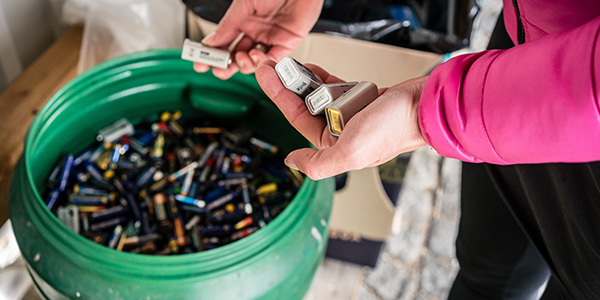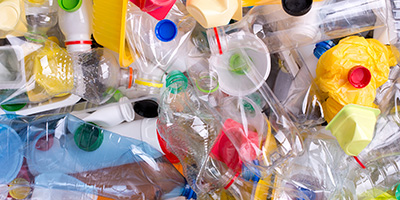Properly Disposing of Batteries: A How-To Guide

How to Dispose of Batteries
When a battery dies, do you know what to do with it? With so many wireless electronics in the home, it’s important to know your options for responsible battery disposal and recycling. For example, you should treat the batteries in your remote control differently than you would the rechargeable ones in your laptop or digital camera.
Learn all you need to know about throwing away your old single-use and rechargeable batteries and how to recycle both types of batteries properly.
How to Dispose of Single-Use Batteries
What is a single-use battery?
Single-use batteries are the most common types of household batteries and include AA, AAA, 9V and D-cell sizes. These are the batteries inside your TV remotes, children’s toys, flashlights and other small electronics. If the battery is not rechargeable, it falls into this category.
Can single-use batteries be thrown in the trash?
Yes, single-use batteries can be disposed of in your regular trash in all states in the U.S. except for California, where it’s illegal to throw away all types of batteries. Prior to 1996, household batteries contained mercury and were treated as hazardous waste, but they are now made of common metals deemed non-hazardous by the federal government. One exception to this rule is the button cell batteries used in watches, which are hazardous and should be disposed of like a rechargeable battery.
Can single-use batteries be recycled?
Yes, you can recycle single-use batteries, but there will be a fee in most cases. “It’s important to remember that every battery can be recycled, turned into a secondary commodity and have a productive life beyond powering our favorite devices,” shares Melissa Kelley of Battery Solutions.
How do you recycle single-use batteries?
- Call your local solid waste district to find out if your community has a collection program or upcoming event.
- Search your area for recycling centers that accept single-use batteries.
- Find a mail-in recycling program that accepts batteries. Most of these programs will sell you a container for storing used batteries that can be mailed once it’s full. Battery Solutions and Call2Recycle both offer options for recycling alkaline batteries in the mail.
You can reduce your need to dispose of household batteries by purchasing rechargeable batteries instead. These can be used more than 1,000 times and recycled at no cost to you.

“[Akaline] batteries are typically found in smoke detectors, remotes and wall clocks. We [at Battery Solutions] collect, sort and recycle more than 6 million pounds of alkaline batteries a year. Using our mechanical process to grind the batteries into three different products; a paper, plastic and brass fraction, a steel fraction, and a zinc manganese concentrate. The zinc manganese concentrate is used as a micronutrient in fertilizer to grow corn. Talk about versatility!”
Melissa Kelley | Director, Marketing Communications at Battery Solutions
Preparing Household Batteries for Recycling
Once you’ve decided how you’ll recycle your old batteries, take a few minutes to prep them for recycling:
- Place a piece of non-conductive tape like duct tape or electrical tape over the ends of each battery to prevent any current transfer. You can also bag each battery individually instead of taping the ends.
- Store the batteries in a plastic or cardboard container that doesn’t conduct electricity in case there is a spark.
- If you’re mailing the batteries to a recycling facility, check for any additional safety steps required for shipping.

How to Dispose of Rechargeable Batteries
What is a rechargeable battery?
Rechargeable batteries are also commonly used around the house, though there are several different kinds. You can find rechargeable batteries in cell phones, digital cameras, power tools, laptops and other powerful electronics in your home.
The main types of rechargeable batteries include:
- Nickel metal hydride and nickel cadmium batteries, which are used in cordless power tools, digital cameras, two-way radios and cordless phones.
- Lithium-ion batteries, which are used in most portable electronics, including cell phones and laptops.
- Small sealed lead acid batteries, which are less common in homes, but typically used in emergency devices, exit signs, security systems, mobility scooters and other special-use electronics.
Can rechargeable batteries be thrown in the trash?
No, rechargeable batteries cannot be disposed of in your trash can or dumpster. Because rechargeable batteries contain heavy metals that can be an environmental hazard, it’s actually illegal to throw them in the garbage in some states.
Can rechargeable batteries be recycled?
Yes, rechargeable batteries can and should be recycled. Recycling rechargeable batteries will usually have no cost for you either.

“First, some batteries have potentially toxic metals in them such as cadmium, lead and, historically, mercury. Diverting these metals from landfill and recycling them instead is important to ensure that the metals don’t leak out of landfills and pollute our drinking water. Second, most batteries can be recycled, which means potentially valuable material, particularly metals, can be reclaimed from them. Recycling batteries minimizes the need to mine virgin resources.”
Carl Smith | CEO & President of Call2Recycle, Inc.
How do you recycle rechargeable batteries?
- Home improvement and office supply stores often accept rechargeable batteries for recycling by hosting a drop box from an organization like Call2Recycle. Find a drop box in your area.
- Find other recycling facilities using Earth911’s Recycling Search or by calling your local solid waste district or city hall.
Read our guide to get rid of electronics you don't use anymore.
Preparing Rechargeable Batteries for Recycling
Once you’ve decided how you’ll recycle your rechargeable batteries, take a few minutes to prep them for recycling:
- Remove the batteries from your electronic device. While this isn’t required for small electronics like cell phones and iPods, laptops must be recycled separately from the dead battery.
- Cover the battery terminals with non-conductive tape like duct tape or electrical tape to prevent current transfer.
- If you’re mailing the batteries to a recycling facility, check for any additional safety steps required for shipping.



